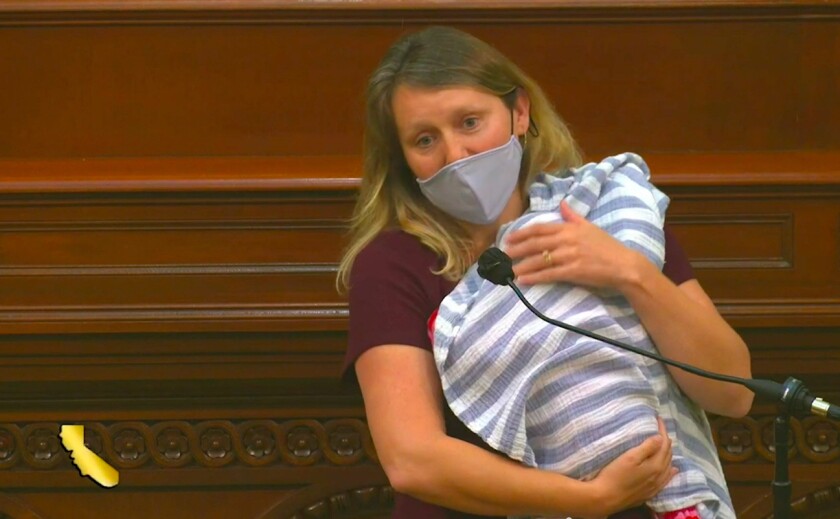Good morning, and welcome to the Essential California
newsletter. It’s
Wednesday, Sept. 2, and I’m writing from Los Angeles.
It was a surreal sight to behold, even nine months into the most surreal year in living memory: a lawmaker holding a swaddled, crying infant on the floor of the state Assembly just before midnight in the middle of a pandemic, making impassioned points on a housing bill while struggling to comfort the baby and adjust the cloth mask slipping down her own face.
It quickly became the kind of viral image that often doubles as an inspiration/outrage litmus test. Was this an uplifting, women-can-do-it-all moment, gleaming with girl-boss sheen? You know, the sort of thing that Hillary Clinton
might share on social media with a flexed bicep “strong” emoji? Or was it an indictment of a clear failure in the system, showcasing how even in the literal halls of power in a state as progressive as California, working mothers still can’t get the accommodations they need?

Assemblywoman Buffy Wicks on the Assembly floor late Monday night.
I can’t tell you how to feel. But here are some of the facts.
Assemblywoman Buffy Wicks (D-Oakland) gave birth on July 26, meaning her daughter Elly was all of 36 days old on Monday night. Wicks had been on maternity leave as the Legislature was wrapping up its work for the year before Monday’s constitutional deadline, and she requested permission to vote remotely ahead of the critical, end-of-session votes.
It was an ask that was well within the realm of possibility. The same week that Elly was born in July, the Assembly
had created a plan to allow the lawmakers most vulnerable to serious risks from the coronavirus to vote remotely by proxy. And over in the Capitol’s other chamber, the state Senate had numerous lawmakers participating remotely during the final days of the session.
As any regular reader of this newsletter already knows, the coronavirus in the state Capitol is not some remote fear. Work in the state Senate
was abruptly halted less than a week ago after a Republican lawmaker from San Diego County tested positive for the virus. That same day, a California Highway Patrol officer who had recently been in the building also tested positive. What’s less known are the risks that the coronavirus poses to infants and postpartum mothers.
According to the CDC, evidence currently suggests that infants may be at increased risk of developing severe illnesses from infection.
But Wicks’ request was denied by Assembly Speaker Anthony Rendon (D-Lakewood) because maternity leave was not considered a high-risk category, as my colleague
Melody Gutierrez explains in her story.
So Wicks traveled to Sacramento from her district in Oakland to cast her votes, with the infant she’d been breastfeeding every two hours for the last four weeks in tow. One of the bills she came to vote on —
a narrowly passed plan to remove a key hurdle that new parents and employees caring for sick family members say keeps them from using the state’s paid leave program — would not have moved forward without her vote.
Wicks was the only Assembly member who asked to vote remotely during the final days of the session, so the specific conditions that
would have been approved remain unclear. But a Rendon spokesperson said in a statement that “the bar of eligibility was always intended to be high, to ensure the protection of our legislative process.” Rendon’s decision drew sharp rebukes on social media and from fellow Democrats,
as Melody observed in her story.
It can be difficult to square away all the contradictions at play. Here we are in 2020, four waves into the feminist movement in a forward-looking state that’s currently run by a governor with a
“parent’s agenda,” in the most extraordinary of times. Yet the realities of a woman bringing a child into the world still can’t clear the bar of eligibility?
In
an interview with KTVU on Tuesday afternoon, Wicks said she hoped the attention on her would open a broader conversation about the stress on families during the pandemic, particularly the low-income families and service workers doing their jobs far from the spotlight of the Legislature floor.
“We are all faced with incredible challenges right now during COVID-19,” she said. “I think what this has also showed us is our social safety net system is not prepared for this. We don’t value working families, we don’t value working parents. Especially new parents — we need better paid leave policies, we need affordable childcare, we need better paid sick days. “
And now, here’s what’s happening across California:
California will have a new COVID-19 reporting system in October. The announcement comes a month after a state public health database failure caused the distortion of COVID-19 test results across California and disrupted the state’s response to the pandemic.
Los Angeles Times
Family and activists decry the shooting death of a Black man by L.A. County sheriff’s deputies: Monday’s shooting death of Dijon Kizzee, 29, has elicited fresh waves of outcry and outrage, and renewed calls for law enforcement transparency and that those involved be arrested and prosecuted.
Los Angeles Times


No comments:
Post a Comment